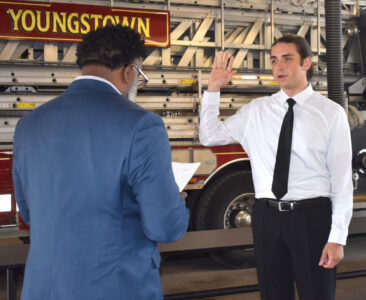Catholics, Lutherans join for common witness to gospel
CANFIELD — Sharing the similarities and common ways of learning and teaching the gospel were addressed by area Lutheran and Catholic religious leaders at a recent Lutheran-Catholic Covenant celebration.
Edward Hahnenberg, professor of Catholic theology at John Carroll University, spoke to more than 60 people, including bishops, pastors and ministers, on “Our Common Witness to the Gospel” focusing on the goal of the ecumenical movement of unity between the churches.
The event was coordinated by the Catholic Diocese of Youngstown and the Northeastern Ohio Synod of the Evangelical Lutheran Church in America.
The day of prayer and study commemorates the signing of the Lutheran-Catholic Covenant in October 2000 by Bishop Thomas Tobin of the Diocese of Youngstown and Bishop Marcus Miller of the Lutheran Synod.
Hahnenberg said the historic difference between Catholics and Lutherans has been teaching of the gospel. He said he has learned from both Catholic and Lutheran colleagues and friends that the task of discerning the truth of the gospel belongs to the entire church.
He said it is important for there to be dialogue between the churches to find concrete ways to teach together in facing the challenges of the world today.
Hahnenberg said while there is differences, both denominations focus on their own traditions and ways to deepen their own understandings and draw their own insights of the gospel.
“Even though there are differences between Catholics and Lutherans, each has sought to teach in good faith and strive to proclaim the gospel. A goal is to think about ways in which we can teach together as to bear common witness to the gospel,” he said.
It was on Oct. 30, 1999, that a joint declaration was signed by Catholics and Lutherans, making this the 20th anniversary.
The Rev. Abraham Allende, bishop of the Northeastern Ohio Synod of the Evangelical Lutheran Church of America, said members of the Lutheran churches want to have a voice in decision making.
Allende said Hahnenberg pointed out in the Catholic church, the decisions are made in Rome while the Lutheran bishops do not have the same authority as the Roman Catholic bishops.
“We can influence, but we can’t compel, which makes it difficult for us. There are those who think we have more authority than we do,” Allende said.
Msgr. Robert Siffrin, vicar general with Diocese of Youngstown, said he enjoyed seeing how Lutherans and Catholics in similar and different ways teach the gospel.
“I enjoy how we teach and witness the gospel in many similar fashions, but there are differences. There are ways we can talk and hear each others’ views,” he said.
Hahnenberg, who is the author or co-editor of five book and is a delegate to the U.S. Lutheran-Catholic Dialogue, said ecumenical unity between Catholics and other Lutherans is important.
Hahnenberg said there is a national effort for unity between the Catholic Church and the Lutheran World Federation, which represents 145 member church bodies in 89 countries, representing over 74 million Lutherans.
That effort resulted in the 1999 Joint Declaration on Justification, in which Catholics and Lutherans affirmed a shared understanding of how God’s grace justifies believers and encourages full unity between Lutherans and Catholics.
Catholics emphasize central authority and preserving a given teaching, while Lutherans emphasize wider involvement, including its bishops and laity, in forming its teachings, and allow for greater flexibility in reconsidering teaching, Hahnenberg said.
bcoupland@triboday.com




